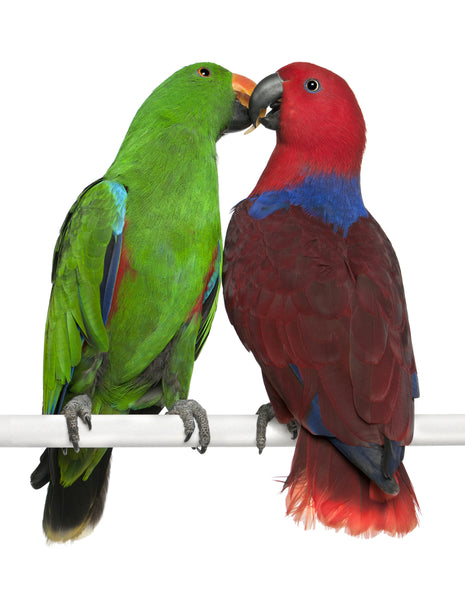Table of Contents
Adolescent and adult parrots get hormonal. Yep. That's the way it is.
In the wild, most parrot species mate once a year and the rest of the year, their hormones are in sort of a dormant state. There are a few species that have longer mating periods, but not many.
There are a number of factors that work together to trigger hormonal behavior in our birds. Birds that are experiencing hormonal behavior become territorial and aggressive. When they don't have an outlet for all that sexual energy, they may resort to feather picking. These are probably not the behaviors you imagined when you adopted your bird, but you can do a few things to refrain from triggering hormonal behavior in your bird.
At Birdsupplies.com, we uphold science-backed parrot wellness.
The most common things that we do to our pet birds that result in hormonal surges revolve around these things
- Petting Your Bird Incorrectly
- Keeping Your Bird Up Too Late At Night
- Feeding Your Bird Incorrectly
- Allowing Your Bird To Nest
When all of these conditions are happening, a birds hormones begin to flow. Its not natural for a bird to be in a hormonal state all of the time. In fact, constantly being in a hormonal state wears down the body and causes a lot of health problems.
How To Manage Hormonal Behavior In Parrots
Now that you know what conditions cause a bird to "go into season," so to speak, you can manipulate your home environment to manage "hormonal behavior."
So, here is the deal. The first step is to learn how to pet your bird. A bird has an extremely sensitive body. Breeding behavior is induced from many senses. From touch to how much light your bird is around to what it eats.
Follow our series to learn how you may be inducing year round hormonal behavior in your bird simply due to it's unique body structure. We offer essential tips on how to offer your bird the appropriate environment and interaction it needs without turning your bird into a hormonal, aggressive family member.
What conditions set off hormonal behavior in parrots?
- Week 1 : Setting the stage by managing the pair bond
- Week 2 : How your bird turns your home into a nest
- Week 3 : Breeding and Diet: Carbohydrate and fat rich foods to avoid
- Week 4 : Simulating photoperiod or light conditions for your irbds health
In a home environment, we unwittingly create conditions that cause our birds to become and maintain reproductive hormone levels, sometimes year round. We actually inadvertently create breeding conditions that trigger reproductive hormone production and accidentally reinforce territorial reproductive behaviors. Hormonal parrots aggressively guard what they perceive to be “resources” needed to rear their young. That means they develop an intense bond with one mate and become very territorial of their perceived nest site.
Good Touch ~ Bad Touch: The Pair Bond

Were you aware that wild birds reserve “petting” or scratching each other on the back, under the wings and other parts of the torso for only the courting and breeding season?
Throughout the rest of the year, while a bonded pair may preen each other or cuddle up at night. Their day is spent in parallel activities in which they keep a bit of distance during flight, feeding and roosting.
Wild birds engage in brief, playful thinking games with each other rather than cuddling and petting interactions
We parrot lovers, though, often look forward to our parrot cuddle time. We cuddle and scratch them all over like we love on a dog or a cat.
We love to rub them up and down their back, under their wings and enjoy watching our birds wallow in the petting. We let our birds cruise around the house on our shoulders. We have them sitting on our lap as we watch our favorite television show lovingly petting them for 15 to 30 minutes or more.
This petting is strictly for your benefit and it can ultimately be harmful for your bird if it puts your bird in a constant hormonal state.
Heavy petting across the back, under the wings, and near the vent actually triggers reproductive hormones in your bird! In fact, copulation in birds begins with lower back scratching! It's a brief contact that lasts maybe 10 to 15 seconds! Afterwards, the birds perch nearby by not touching. They are parallel but not touching.
Are You Petting Your Bird Too Much?
If your bird is a one-person bird and has territorial behavior, feather plucking or screaming. Or, its regurgitating or masturbating on you, back off on whole body petting right now!
Reserve petting to your birds head and its feet. Birds love to have the skin around their beaks rubbed and their ears scratched. Your bird will love you just as much if you pet it correctly. Although, it may go through withdrawals.
Rather than "heavy petting," start doing parallel activities by having your bird nearby on a bird stand. This quality time will simulate how wild birds interact for most of the year and will not provoke hormonal behavior.
Create fun, yet brief games to play with your parrot throughout the day such as a dancing to music while squawking, playing peek- a-boo, and even teaching it to chase or catch a ball. Get Clicker Training For Birds and train your bird.
Learning to pet and interact with your bird without making it hormonal will go a long way toward straightening out undesired behavior.
What games do you play with your bird to enhance bonding? Leave us a comment.
Learn more about bird hormones in this post: The Ultimate Guide To Parrot Hormonal Season
Hey, please leave a comment or share this on your social media if you love this post!
















